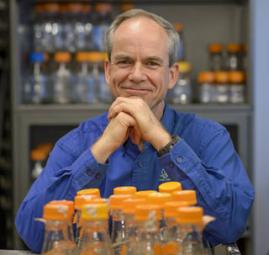
John Hogan is an environmental scientist in the Bioengineering Branch at NASA’s Ames Research Center, Moffett Field, Calif., where he supports NASA’s Life Support and Habitation Systems Program.
His major research interests include developing biological and physico-chemical technologies for regenerative air, water and solid waste treatment systems, food production, and systems analysis. Selected projects include the development of optimized biological solid waste reactors/simulators, biological air filtration, and the capture and compression of carbon dioxide. He also is investigating the application of closed-loop life support principles to forward sustainable practices in terrestrial systems.
Prior to joining NASA, he was research faculty at Rutgers, the State University of New Jersey in the Department of Environmental Sciences, where he participated in a NASA funded program developing biologically-based, sustainable systems for long-term extraterrestrial human habitation. John received his B.S., M.S. and Ph.D. in Environmental Sciences at Rutgers University.
His major research interests include developing biological and physico-chemical technologies for regenerative air, water and solid waste treatment systems, food production, and systems analysis. Selected projects include the development of optimized biological solid waste reactors/simulators, biological air filtration, and the capture and compression of carbon dioxide. He also is investigating the application of closed-loop life support principles to forward sustainable practices in terrestrial systems.
Prior to joining NASA, he was research faculty at Rutgers, the State University of New Jersey in the Department of Environmental Sciences, where he participated in a NASA funded program developing biologically-based, sustainable systems for long-term extraterrestrial human habitation. John received his B.S., M.S. and Ph.D. in Environmental Sciences at Rutgers University.
